- Home
- Dan Gutman
Babe & Me Page 2
Babe & Me Read online
Page 2
I didn’t want to give the card back. Someday, I thought, I would use that card. My dad had told me the story of the called shot many times. It fascinated me. Someday, I thought, when my mom felt I was old enough, I would travel through time again. I would see with my own eyes whether or not the Babe called his famous home run in the 1932 World Series. If I gave the card back to Dad and he sold it, I would never get the chance.
That’s when I came up with an idea.
I ran down the stairs with the Ruth card in my hand. Mom and Dad were standing around awkwardly, trying to make small talk.
“Instead of giving you the card,” I suggested, “what if I use it?”
“What do you mean, use it?” Mom asked suspiciously.
“You mean use it to go back in time?” Dad asked.
“Yeah. I could go back to 1932 and bring back a bunch of cards. You’ll make a lot more money than if you just sold this one.”
“Absolutely not!” my mother exclaimed. “We talked about this, Joey. I won’t have you going back in time anymore.”
“Aw, Mom!”
“Why not?” Dad asked.
“Because it’s too dangerous, that’s why not,” Mom explained. “What if Joey got stuck in the 1930s? Or killed?”
“I’m not going to get killed,” I insisted. “Please, Mom?”
“No!”
“I don’t want to give the card back,” I protested. “It will be so easy for me to just travel back to 1932, grab some old baseball cards, and bring them back with me. Dad could sell them for a lot of money.”
“You see what you started?” Mom glared at Dad.
“What did I do?” Dad asked, holding his hands up innocently.
“You started him on this stupid card collecting.”
“It’s not stupid!” I chimed in.
“Well,” Dad said, “what if I went back with Joe?”
“You mean, back to 1932?” I asked.
“Yeah. Can we do that? Can you take someone with you?”
“I don’t know,” I admitted. I had never tried to take anyone with me.
“You hardly spend any time with Joey in the present,” Mom complained. “You expect to take care of him in the past?”
“I’m unemployed now,” Dad said. “I’ve got plenty of time. I’ll take good care of the boy, Terry. I am his father.”
Mom shook her head and let out a sigh.
“How long will it take?” she asked.
“A few days,” I replied.
“I’ll give you three days,” she told Dad. “If Joey’s not back in three days, I will never let you take him anywhere again.”
Big deal, I thought. He hardly ever takes me anywhere anyway.
“We’ll be back,” Dad said. “I promise.”
I had mixed feelings about taking Dad back in time with me. It would be awkward hanging out with him, I knew. But it might give us a chance to get to know each other again, too. And who knew? Maybe I would be able to find out why he was so angry all the time. I walked Dad to the door and asked him when we would leave for our trip to 1932.
“Tomorrow.”
3
Going Back…Back…Back…
WHEN DAD CAME OVER THE NEXT DAY, I ALMOST DIDN’T recognize him. He was wearing a dark brown suit that looked a little too big on him, a vest, and a tie. He had on two-toned shoes and a hat that looked like the kind gangsters wear in old movies.
“How do I look, Butch?” he asked when I opened the door. “Pretty snazzy threads, huh?”
He handed me a big cardboard box and told me to open it. Inside was a wool sports jacket, a flat cap with a very small brim, and a pair of navy wool pants. The pants weren’t long enough to be long pants, but they weren’t short enough to be shorts, either.
“What’s up with this?” I asked, holding up the pants.
“They’re knickers,” he replied. “If you want to fit in, you’ve got to dress the part. I did a little research to find out what boys wore in 1932.”
“They dressed like dorks,” I said, taking off my jeans and pulling on the knickers. I think even Mom would have gotten a laugh out of seeing me and Dad all dressed up. But she was out grocery shopping.
“Back in the 1930s, this was cool,” Dad said.
Dad took out a thick wallet and opened it for me. It was stuffed with bills. My dad doesn’t have a lot of money. He must have taken his life savings out of the bank.
“There’s more hidden in my sock,” he revealed. “And it’s all old currency. I know a guy who collects the stuff.”
“Why do you need to bring along so much cash?” I asked.
“I worked out a plan, Joe. I figure if we’re going to do this thing, we should do it right. Make some serious money. First, when we get to 1932, we’re going to find a bank and deposit five thousand bucks.”
“What for?”
“Because if we deposit five thousand bucks, it will start earning interest in 1932. Then, when we get home and I go back to the same bank seventy years later, that five thousand will have grown. If it earns just five percent interest, in seventy years it will be worth more than a hundred and sixty thousand dollars! I figured it out on a computer.”
“Wow! That’s pretty smart, Dad.”
“Oh, I’m just getting started,” Dad continued excitedly. “After we deposit the money in the bank, we’re going to find a bookmaker.”
“Somebody who makes books?”
“No, somebody who takes bets. A bookie. I know the Yankees are going to win the 1932 World Series in four straight games. It’s in the history books. I even know the final score of all the games. But they don’t know this stuff in 1932 until after the games are played. I’ll be able to place a bet on the Series and make a fortune.”
“Dad, you’re a genius!”
“Finally,” he continued, “if we’re lucky enough to get close to Babe Ruth at all, we’re going to get him to sign as many bats, balls, and gloves as we can. That stuff is worth a pile of money in today’s memorabilia market. One baseball signed by the Babe sells for about five thousand bucks.”
Even as I marveled at my dad’s moneymaking schemes, they made me feel a little bad. I didn’t think it was illegal or anything, but it seemed slightly dishonest to go back in time and use what you know about the future to make a lot of money.
What made me feel worse was that it was all my idea to begin with. Dad saw the look on my face.
“Joe,” he said, “I’m getting desperate. I’ve tried my hardest to make an honest living. I really did. It hasn’t worked out. Think of this as a way we can help each other. You help me make a few bucks, and I help you go to 1932 to see if Babe called his shot. What’s wrong with that?”
Nothing, I decided. Dad and I sat down on the living room couch next to each other. I took the Ruth card out of its plastic holder.
“How do we do this?” Dad asked. “Do I hold the card, too?”
“The power isn’t in the card,” I told him. “It’s in me. To take you along, there has to be a connection between you and me.”
I hadn’t held hands with my dad in years, but there was no other way. I put out my hand and he took it. His palm was sweaty. So was mine. I held the Ruth card in my other hand.
“Close your eyes,” I instructed. I closed mine, too. Almost immediately, I felt the tingling.
“Do you feel anything?” I asked.
“Yeah, a weird sensation,” Dad replied, “like my foot’s asleep, but it’s my hand.”
“Wait!” I said suddenly, dropping the card.
“What’s the matter?”
“I forgot something.”
I ran up to my room and grabbed a new pack of baseball cards from my desk drawer.
“They have bathrooms in 1932, y’know,” Dad joked when I got back.
“I didn’t go to the bathroom,” I explained. “A baseball card is like a plane ticket for me. The Ruth card will send us to 1932. But it won’t get us back home. We need to bring a new card with us for
that. If I didn’t have one with me, we would have been stuck in 1932 forever.”
I slipped the new pack of cards into my pocket and sat on the couch again.
“Is there anything else you forgot?” Dad asked, a little annoyed.
“No, let’s do it.”
I picked up the Ruth card again and grabbed Dad’s hand. We closed our eyes. The tingling sensation started right up again. I visualized Babe Ruth and the 1932 World Series. If only I could go there, I thought.
“Feel it?” I asked Dad.
“I feel it,” he replied. “It’s working….”
And then everything faded away.
4
Blown Off Course
WHEN I OPENED MY EYES, WE WERE NO LONGER SITTING on the living room couch. We were sitting outdoors on a hard bench. A big car whizzed by, spraying a cloud of exhaust over us. It was a big, boxy old car, with the spare tire mounted right outside the passenger side. The tire had a bunch of spokes in it, like a bicycle tire.
“It worked!” marveled Dad. “It really worked!”
I looked up. The building across the street stretched up and down the block. More boxy old cars streamed down the street. It felt chilly out, much colder than it had been back in Louisville.
“We must be in Chicago, Joe,” Dad said excitedly. “Chicago in 1932. Look at the cars! There’s a 1931 Bentley Tourer. And a 1929 Pierce-Arrow.”
We got up and started walking, staring at the buildings and the cars rushing past. Louisville was a big city, but it was nothing like this. I had never been to Chicago.
On the corner was a boy about my age. He was holding up a newspaper.
“Yanks beat Cubs in Game Two!” he shouted. “Read all about the World Series!”
Dad picked up a paper from the pile on the newsboy’s wooden box.
* * *
ROOSEVELT LEADING IN MAGAZINE’S POLL
______________
Eleven Republican States Give Him Slightly Bigger Total
______________
MAINE SWINGS TO HOOVER
______________
California, President’s Home State, Favoring Rival, as Latter Holds Early Gains in Pennsylvania
______________
Eleven States, normally Republican in a Presidential year, give Governor Franklin D. Roosevelt a slight lead over President Hoover, his Republican opponent.
The total of votes in the eleven States gives Mr. Hoover 100,323, or 45.18 per cent of the total, and Mr. Roosevelt 102,185, or 46.03 per cent. The remaining 8.79 of the total vote is divided among minor candidates.
* * *
“Hey, why are you selling the New York Journal?” he asked the boy.
The kid looked at Dad suspiciously. “Faw da fun of it, Mac. I’m really a millionaire. Ya wanna paper or not?”
“Are we in New York City or Chicago?” I asked the newsboy.
He gave me the same look he gave to Dad. “If you don’t even know where you are, buddy, ya got big problems.”
“How much for a paper?” Dad asked.
“Two cents, Mac.”
Dad flipped the kid a quarter.
“Keep the change,” he said.
The newsboy looked at the quarter as if it were a piece of gold.
“Thanks, mister!” Suddenly he was a lot friendlier.
Dad hustled me away, and I could see the growing anger in his eyes.
“What are we doing in New York?” he complained. “Ruth called his shot in Chicago, at Wrigley Field.”
“I don’t know!” I was mad, too. “It’s not like in the movies! It’s not like I can turn a dial on some time machine and land exactly where I want to go. I got us to 1932, didn’t I?”
“All right, all right, let’s both calm down,” Dad said, still angry.
He started flipping through the paper, looking for the sports section, I guessed. There was no separate sports section the way newspapers have today. Finally, Dad found the few pages of the paper that were devoted to sports. Most of the sports coverage was about the World Series.
This is what the lead article said…
* * *
YANKEES DEFEAT CUBS IN GAME 2
Capacity Crowd Expected to Witness Game Three in Chicago on Saturday
ROOT WILL PITCH FOR CUBS
TALK OF FOUR GAME SWEEP
By HERB DUNN
NEW YORK, Sept. 29—The New York Yankees whipped the Chicago Cubs again to take a two games to none lead in the World Series. Lou Gehrig had three hits and scored two runs in the 5-2 victory. Mound ace Lefty Gomez had some trouble in the third inning, but shut the men from Chicago down the rest of the way.
* * *
“You must have messed up somehow,” Dad said, barely disguising his disgust. “We have to find a way to get to Chicago for Game Three on Saturday.”
“Maybe we can fly,” I suggested quietly.
“I doubt that they had regular flights in 1932,” Dad said. “And I’m not sure I’d want to get on one of those old planes anyway. The Wright brothers only invented the airplane about thirty years ago.”
A sign at the corner said 12TH STREET. We started walking, looking for a taxi or a subway train that would take us to Grand Central Terminal. That was the famous train station in New York, Dad told me.
We walked past a store with a big PENNY ARCADE sign on it. It was like a video game arcade, but there were no video games inside. They had simple pinball games, a shooting gallery, and these big wooden boxes where people could drop in a penny, turn a crank, and peer into a tiny window. Dad said they were called nickelodeons, like the TV channel. I wanted to try it, but Dad didn’t seem to be in the mood for stopping.
As we walked past other stores, I couldn’t help but notice the signs—MEN’S SHOES: $8.50. MEN’S SUITS: $25. BREAKFAST: 25 CENTS. Somebody was renting an apartment for $50 a month. Dad’s mood seemed to brighten.
“Look at this, Joe,” he said excitedly. “In 1932, you could go to the movies for just fifty cents…and see a double feature!”
We walked silently. I had an idea what might be going through his head. Back home, he had no job, no wife, no life, and big bills. With his life savings, he could live like a king in 1932.
I didn’t say anything. If he wanted to stay in 1932, it was fine with me. I hardly ever saw him anyway.
It would have been easy for the two of us to part company right there. I could have used my new baseball cards to go back home, and Dad could have started his life over again in 1932.
But suddenly we heard a commotion down the street, around the corner. People were yelling and chanting. Something was going on.
5
Hooverville
DAD AND I TURNED THE CORNER OFF FIFTH AVENUE, AND there, in the middle of New York City, was a park. It surprised me, and I think it surprised Dad too. A small sign read UNION SQUARE PARK.
But there was no playground or anything. Nobody was playing ball or lounging in the sun in this park.
One side of the park had a row of rickety shacks made out of packing cases and sheets of scrap metal. One of them was painted with the words WELCOME TO HOOVERVILLE. Inside one of the shacks, a lady and two kids were warming their hands over a fire they had made in a metal garbage can.
As soon as we entered the park, a couple of guys with scraggly hair and worn clothing surrounded us. They held out their hands and asked politely, “Got any spare change?” Dad gave each of them a nickel, which made them extremely happy.
“We sure ain’t gonna find Babe Ruth here,” Dad said, annoyed.
As we walked into the park, I saw people selling pencils and old ladies selling fruit from baskets. Guys were sleeping on the grass, wrapped in overcoats.
As we walked into the park, I saw people selling pencils and old ladies selling fruit from baskets.
Some people were just wandering around with nothing to do. They had dazed, hopeless looks on their faces, like they had survived an earthquake and didn’t know what to do next.
“I complet
ely forgot,” Dad said, staring at some men who were washing their clothes in a fountain. “The Depression—1932 was the worst of it.”
I had heard about the Depression, but didn’t know much about it. Dad told me that in 1929 the stock market crashed, sending America—and the whole world—into a Depression. Rich people became penniless overnight. Thousands of companies went out of business, and millions of people lost their jobs.
People had no money. Farmers stopped growing crops because nobody could afford to buy them. Factories shut down because people weren’t buying any goods. Hundreds of people waited in lines to apply for a single job or get a loaf of bread. There was no welfare back then, no help for people who were in need.
Kids starved. A lot of people just gave up and killed themselves. It went on like that for years.
Half of me wanted to get out of the park, but the other half was fascinated by it all. We walked around. At the corner of the park on the sidewalk a row of six or seven people stood on wooden crates, each crate about twenty feet apart. They were making speeches, and small groups of people gathered around them to listen. From a distance, the voices of the speakers blended into one another, but as we got closer, I could see that each one had his own message.
“I fought in the Great War!” a man shouted. “Now I can’t buy corn to feed my family.”
“My brother’s a farmer in Iowa,” a guy yelled back. “He can’t make a living selling corn for just eight cents a bushel!” Some people booed, and somebody threw a rock at the guy whose brother was a farmer.
“Tell your brother to plow his corn under!” somebody hollered. “Tell him to show the government he won’t stand for it.”
“If the government won’t give us food, I say we just take it,” an angry man yelled. “We’ve waited long enough.”

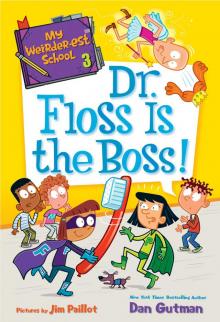 My Weirder-est School #3
My Weirder-est School #3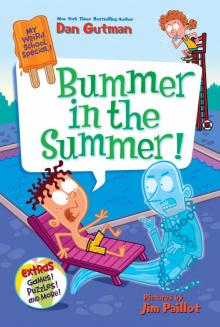 Bummer in the Summer!
Bummer in the Summer!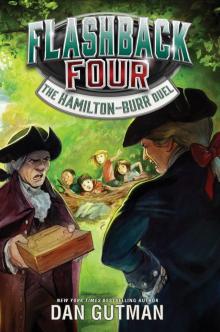 Flashback Four #4
Flashback Four #4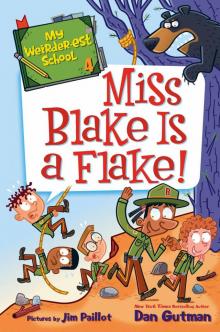 Miss Blake Is a Flake!
Miss Blake Is a Flake!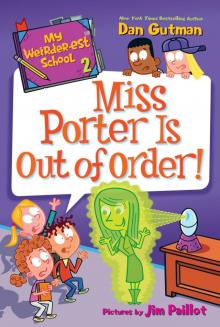 My Weirder-est School #2
My Weirder-est School #2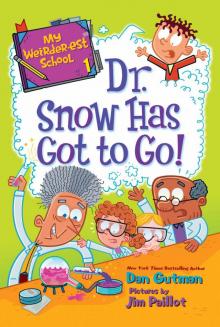 My Weirder-est School #1
My Weirder-est School #1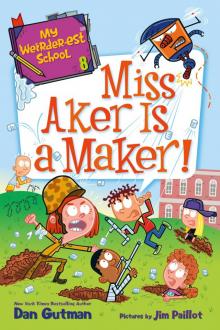 Miss Aker Is a Maker!
Miss Aker Is a Maker!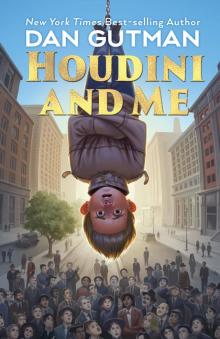 Houdini and Me
Houdini and Me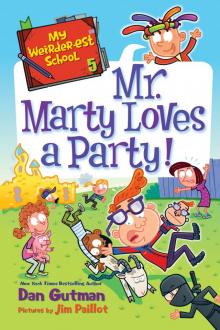 Mr. Marty Loves a Party!
Mr. Marty Loves a Party! Ms. Jo-Jo Is a Yo-Yo!
Ms. Jo-Jo Is a Yo-Yo!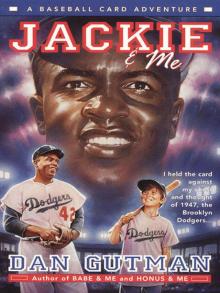 Jackie & Me
Jackie & Me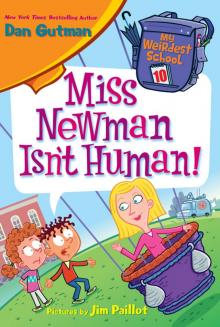 Miss Newman Isn't Human!
Miss Newman Isn't Human!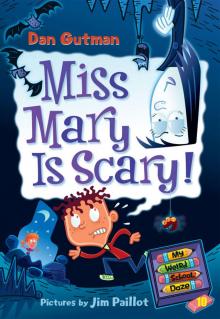 Miss Mary Is Scary!
Miss Mary Is Scary!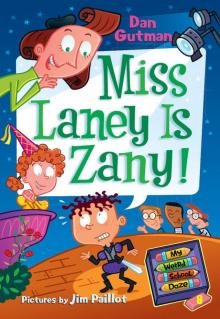 Miss Laney Is Zany!
Miss Laney Is Zany!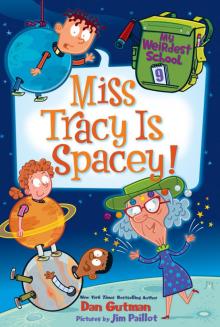 Miss Tracy Is Spacey!
Miss Tracy Is Spacey!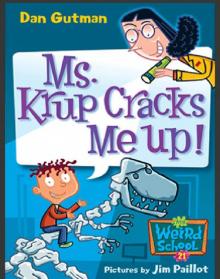 Ms. Krup Cracks Me Up!
Ms. Krup Cracks Me Up!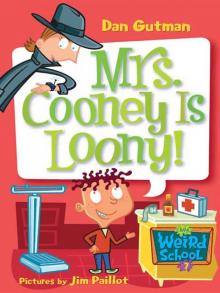 Mrs. Cooney Is Loony!
Mrs. Cooney Is Loony!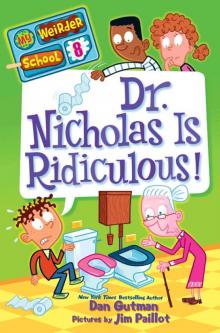 Dr. Nicholas Is Ridiculous!
Dr. Nicholas Is Ridiculous!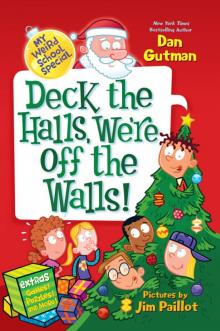 My Weird School Special
My Weird School Special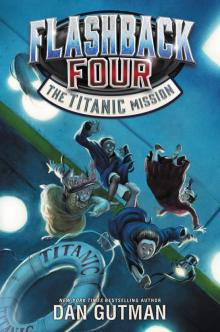 The Titanic Mission
The Titanic Mission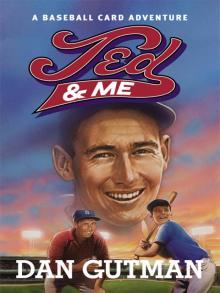 Ted & Me
Ted & Me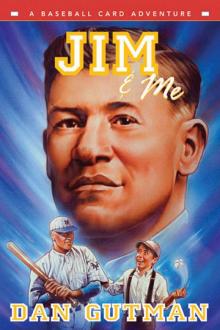 Jim & Me
Jim & Me Miss Child Has Gone Wild!
Miss Child Has Gone Wild! The Talent Show
The Talent Show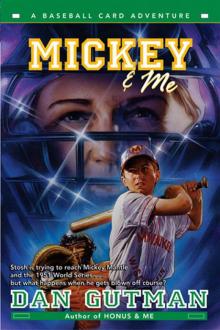 Mickey & Me
Mickey & Me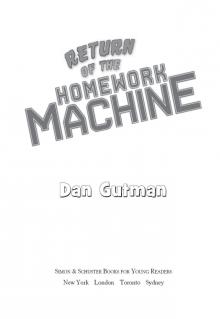 Return of the Homework Machine
Return of the Homework Machine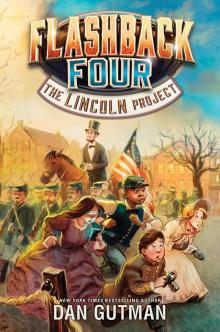 The Lincoln Project
The Lincoln Project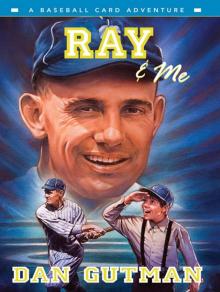 Ray & Me
Ray & Me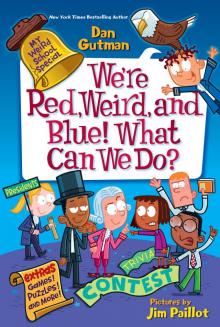 We're Red, Weird, and Blue! What Can We Do?
We're Red, Weird, and Blue! What Can We Do? The Get Rich Quick Club
The Get Rich Quick Club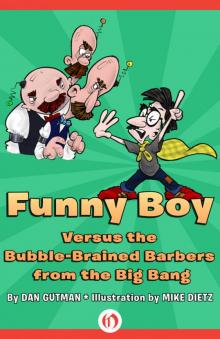 Funny Boy Versus the Bubble-Brained Barbers from the Big Bang
Funny Boy Versus the Bubble-Brained Barbers from the Big Bang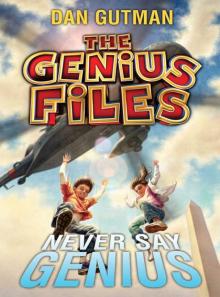 Never Say Genius
Never Say Genius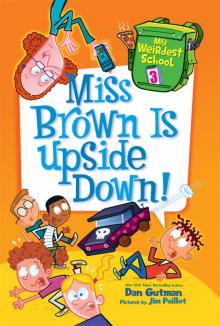 Miss Brown Is Upside Down!
Miss Brown Is Upside Down!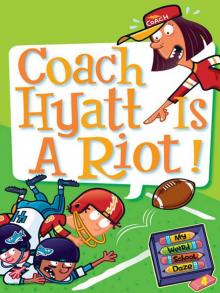 Coach Hyatt Is a Riot!
Coach Hyatt Is a Riot!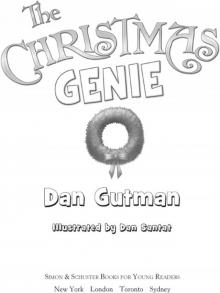 The Christmas Genie
The Christmas Genie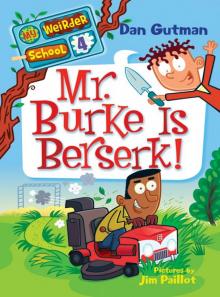 Mr. Burke Is Berserk!
Mr. Burke Is Berserk!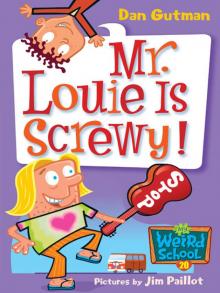 Mr. Louie Is Screwy!
Mr. Louie Is Screwy!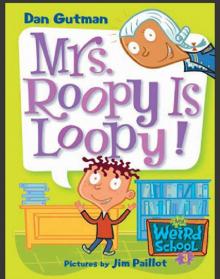 Mrs. Roopy Is Loopy!
Mrs. Roopy Is Loopy!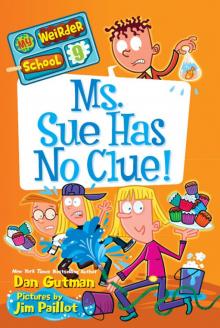 Ms. Sue Has No Clue!
Ms. Sue Has No Clue!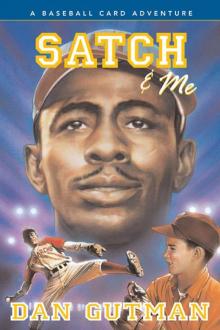 Satch & Me
Satch & Me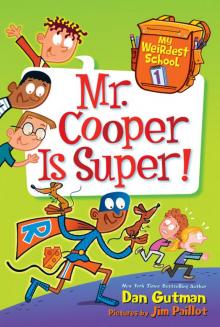 Mr. Cooper Is Super!
Mr. Cooper Is Super!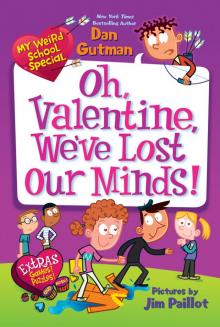 Oh, Valentine, We've Lost Our Minds!
Oh, Valentine, We've Lost Our Minds!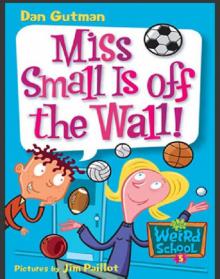 Miss Small Is off the Wall!
Miss Small Is off the Wall!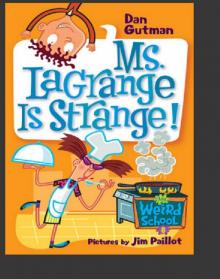 Ms. LaGrange Is Strange!
Ms. LaGrange Is Strange!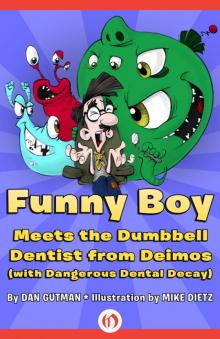 Funny Boy Meets the Dumbbell Dentist from Deimos (with Dangerous Dental Decay)
Funny Boy Meets the Dumbbell Dentist from Deimos (with Dangerous Dental Decay)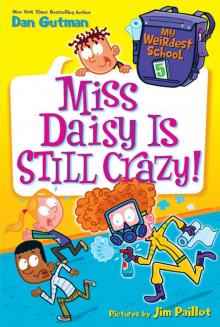 Miss Daisy Is Still Crazy!
Miss Daisy Is Still Crazy!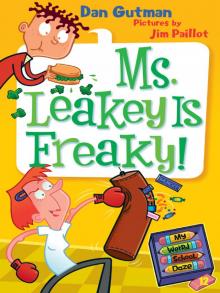 Ms. Leakey Is Freaky!
Ms. Leakey Is Freaky!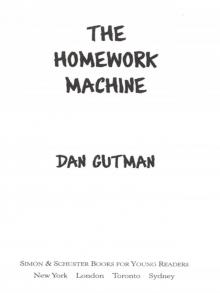 The Homework Machine
The Homework Machine Miss Holly Is Too Jolly!
Miss Holly Is Too Jolly!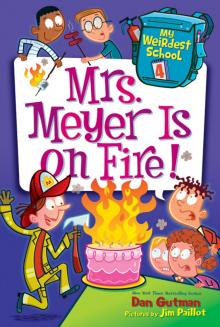 Mrs. Meyer Is on Fire!
Mrs. Meyer Is on Fire!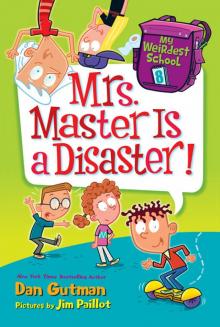 Mrs. Master Is a Disaster!
Mrs. Master Is a Disaster!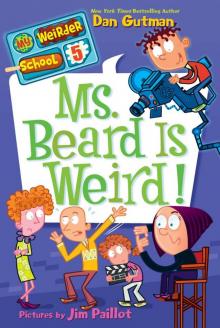 Ms. Beard Is Weird!
Ms. Beard Is Weird!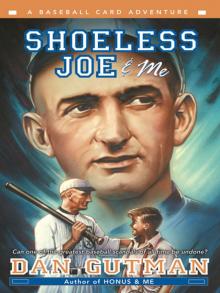 Shoeless Joe & Me
Shoeless Joe & Me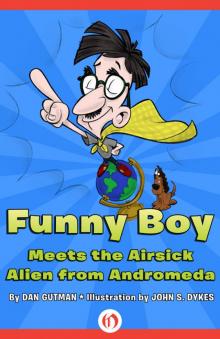 Funny Boy Meets the Airsick Alien from Andromeda
Funny Boy Meets the Airsick Alien from Andromeda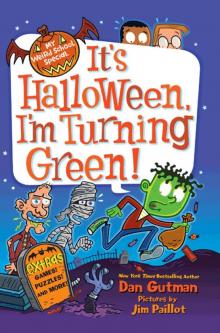 My Weird School Special: It’s Halloween, I’m Turning Green!
My Weird School Special: It’s Halloween, I’m Turning Green!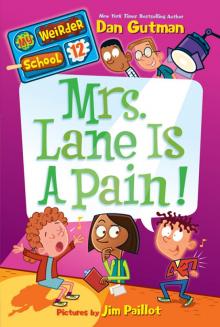 Mrs. Lane Is a Pain!
Mrs. Lane Is a Pain!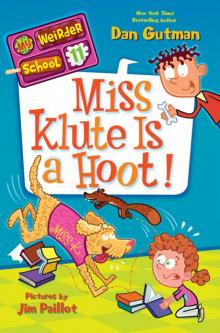 Miss Klute Is a Hoot!
Miss Klute Is a Hoot!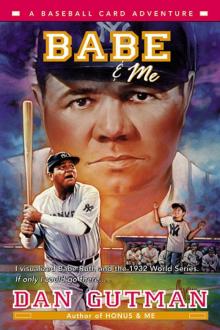 Babe & Me
Babe & Me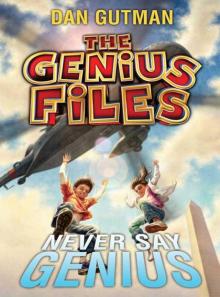 The Genius Files 2 Never Say Genius
The Genius Files 2 Never Say Genius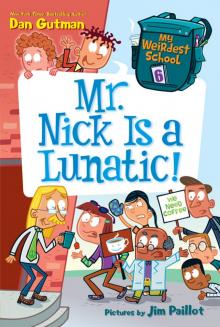 Mr. Nick Is a Lunatic!
Mr. Nick Is a Lunatic!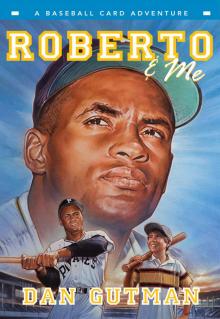 Roberto & Me
Roberto & Me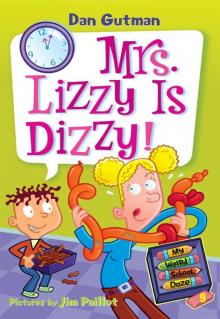 Mrs. Lizzy Is Dizzy!
Mrs. Lizzy Is Dizzy!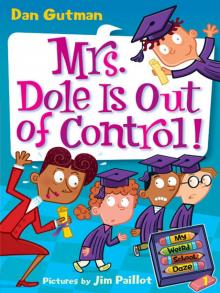 Mrs. Dole Is Out of Control!
Mrs. Dole Is Out of Control!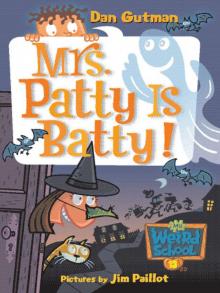 Mrs. Patty Is Batty!
Mrs. Patty Is Batty!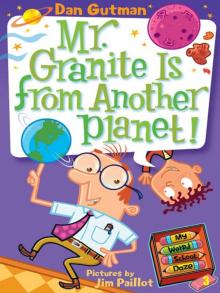 Mr. Granite Is from Another Planet!
Mr. Granite Is from Another Planet!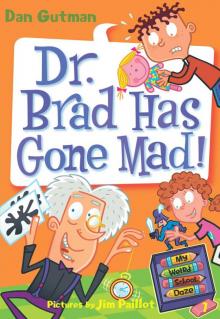 Dr. Brad Has Gone Mad!
Dr. Brad Has Gone Mad!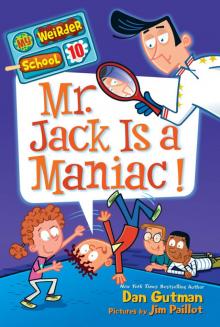 Mr. Jack Is a Maniac!
Mr. Jack Is a Maniac!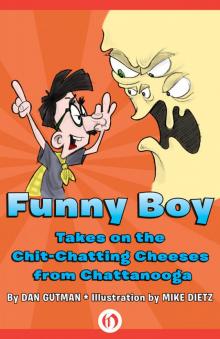 Funny Boy Takes on the Chit-Chatting Cheeses from Chattanooga
Funny Boy Takes on the Chit-Chatting Cheeses from Chattanooga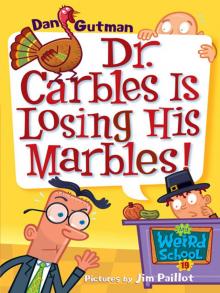 Dr. Carbles Is Losing His Marbles!
Dr. Carbles Is Losing His Marbles!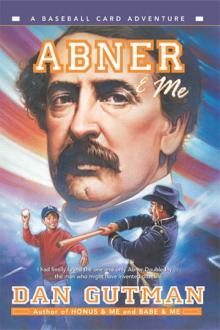 Abner & Me
Abner & Me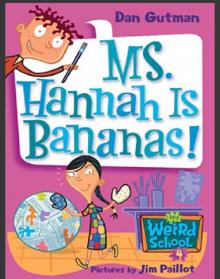 Ms. Hannah Is Bananas!
Ms. Hannah Is Bananas!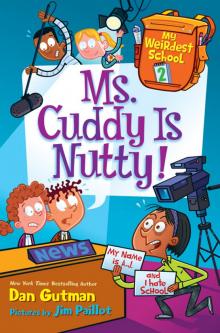 My Weirdest School #2
My Weirdest School #2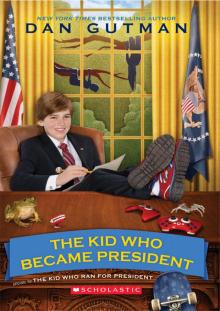 The Kid Who Became President
The Kid Who Became President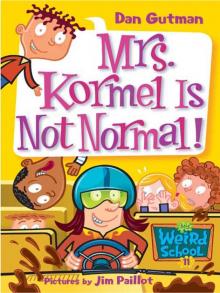 Mrs. Kormel Is Not Normal!
Mrs. Kormel Is Not Normal!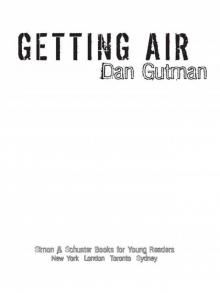 Getting Air
Getting Air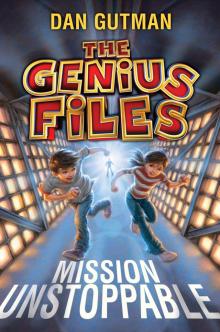 Mission Unstoppable
Mission Unstoppable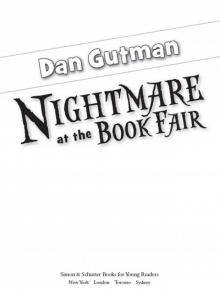 Nightmare at the Book Fair
Nightmare at the Book Fair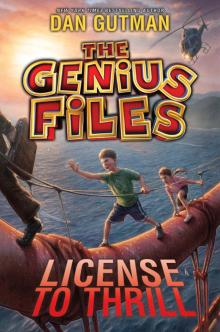 License to Thrill
License to Thrill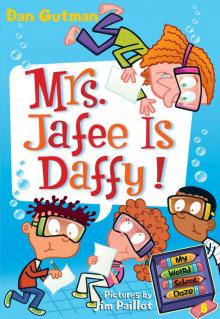 Mrs. Jafee Is Daffy!
Mrs. Jafee Is Daffy!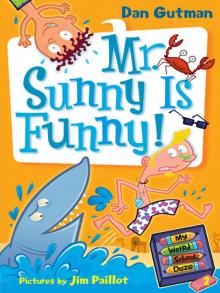 Mr. Sunny Is Funny!
Mr. Sunny Is Funny!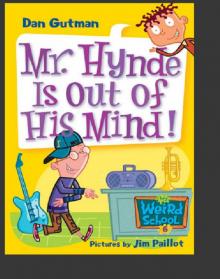 Mr. Hynde Is Out of His Mind!
Mr. Hynde Is Out of His Mind!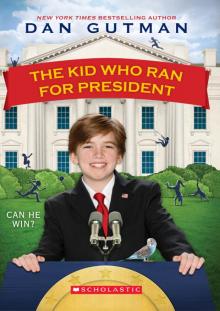 The Kid Who Ran For President
The Kid Who Ran For President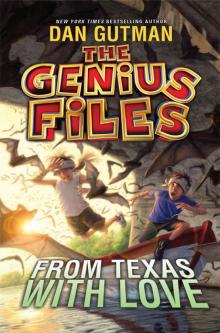 The Genius Files #4
The Genius Files #4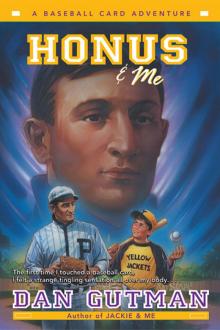 Honus & Me
Honus & Me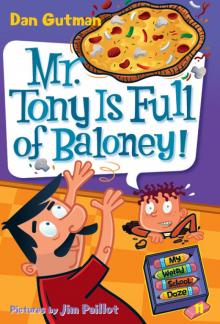 Mr. Tony Is Full of Baloney!
Mr. Tony Is Full of Baloney!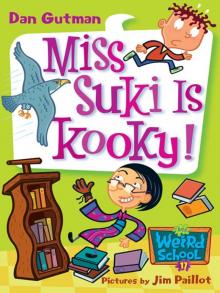 Miss Suki Is Kooky!
Miss Suki Is Kooky!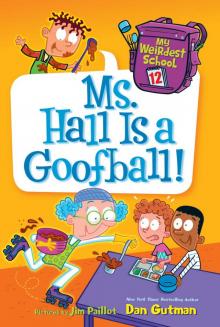 Ms. Hall Is a Goofball!
Ms. Hall Is a Goofball!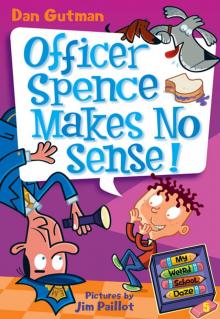 Officer Spence Makes No Sense
Officer Spence Makes No Sense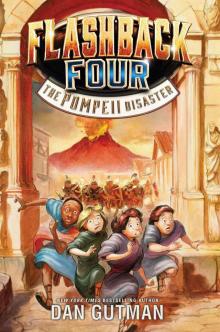 The Pompeii Disaster
The Pompeii Disaster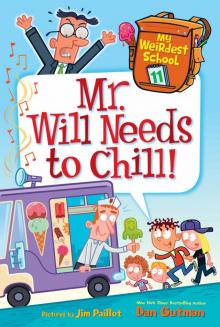 Mr. Will Needs to Chill!
Mr. Will Needs to Chill!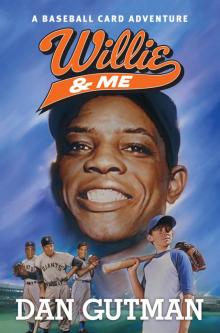 Willie & Me
Willie & Me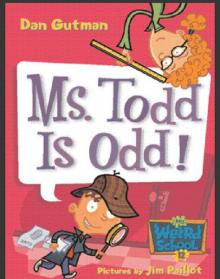 Ms. Todd Is Odd!
Ms. Todd Is Odd!